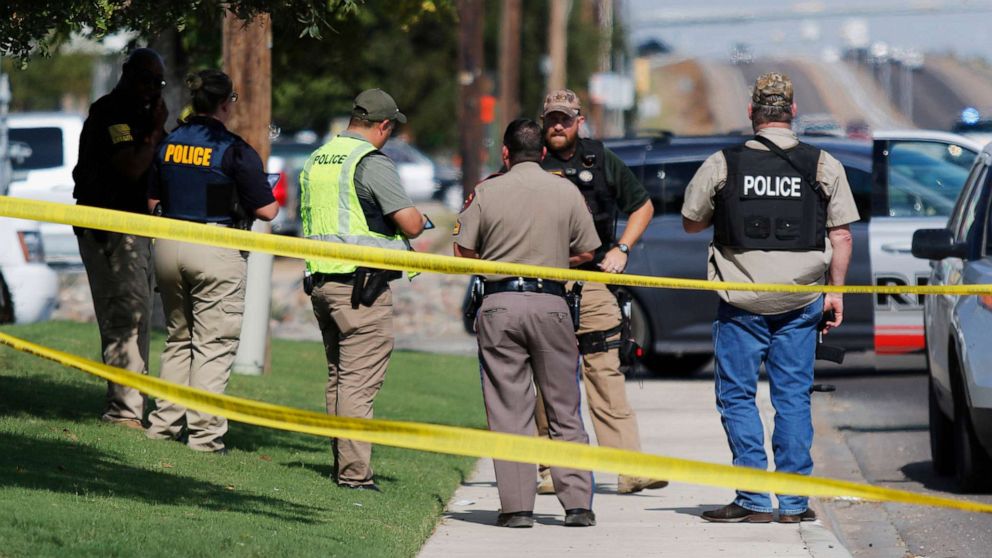Gun law loophole allowed Odessa mass shooting suspect to buy AR-type assault rifle: Sources
The suspect who allegedly gunned down seven people and injured more than 20 in a Labor Day weekend massacre in western Texas appeared to have exploited a loophole in federal gun regulations to obtain the AR-type assault rifle he used in the rampage, multiple law enforcement sources told ABC News on Tuesday.
Suspected mass shooter Seth Aaron Ator, 36, who was killed by police, was able to get his hands on the weapon through a private sale despite being considered a "prohibited person" barred by law from possessing a firearm because he had been diagnosed by a clinician as mentally ill, federal and local law enforcement sources said.
Under federal law, a gun seller may not sell a weapon if he or she knows the buyer has been flagged by law enforcement but is not obligated to conduct a background check or even ask the purchaser's status to own a weapon.

John Wester, a special agent for the federal Bureau of Alcohol, Tobacco, Firearms and Explosives, confirmed that Ator had previously failed a firearms background check.
"The background check was run through the National Instant Criminal Background Check System. The NIC system did work. He applied to get a gun. He was denied a gun," Wester said at a news conference on Monday, but declined to say why Ator was rejected.
Sources later told ABC News that Ator was rejected because he was mentally ill.
Ator was terminated from his job at the Journey Oilfield Service in Odessa on Saturday morning, just hours before he allegedly went on a killing spree and minutes before he contacted law enforcement to complain about his employer, Odessa Police Chief Michael Gerke said at the news conference.
"Right after that firing, he called Odessa Police Department's 911, and so did his employer," Gerke said. "And basically they were complaining on each other because they had a disagreement over the firing."
During the calls to the 911 center and a subsequent call to the FBI National Tip Line, Ator never made any threats of violence, Gerke said.

Christopher Combs, special agent in charge of the FBI field office in San Antonio, described the calls Ator made to law enforcement as the "rambling and incoherent" gibberish of someone in "great mental distress." He said Ator complained that the employer who fired him was holding him against his will.
"Frankly, the dispatchers, the call takers, couldn't figure out what he was talking about," said Combs who added that the FBI tip line gets 800,000 calls a year.
Combs said investigators do not believe being dismissed from his job prompted Ator to allegedly commit the massacre.
"He showed up to work in a very distressed mental state. So it's not because he got fired," Combs said. "This did not happen because he was fired. When he showed up to work he was already enraged.
"He was on a long spiral of going down," Combs said. "He didn't wake up Saturday morning and walk into his company and then it happened. He went into that company in trouble. He's probably been in trouble for a while."
The shootings unfolded at 3:15 p.m. local time on Saturday, about 15 minutes after Ator called the FBI's National Tip Line, Combs said.
The first victim in the rampage was a Texas Department of Public Safety trooper who pulled the suspect over for failing to signal before making a turn, Gerke said. As the trooper approached the car, Ator allegedly opened fire with an AR-type assault rifle, wounding the trooper, he said.
Gerke said the trooper had no prior knowledge of the phone calls Ator made to law enforcement before pulling the suspect over.
Ator then allegedly drove around in his vehicle randomly firing at victims in 20 different locations, including a car dealership and outside a movie theater, police said.
The victims killed ranged in age from 15 to 57.
One of the victims was Mary Granado, a 29-year-old U.S. Postal Service worker, who Ator allegedly shot to death during a carjacking, Gerke said.
The suspect allegedly ditched his car and stole Granado's postal service van after killing her, Gerke said. He continued driving around the Odessa area, firing at people at random, the chief said.
The alleged killer then sped toward the Cinergy center, a local entertainment complex that includes a cineplex and a laser-tag range.
Gerke said the carnage could have been much worse had the police not killed Ator before he got inside a crowded movie theater.
A cellphone video taken by a witness showed the suspect speeding toward a police roadblock outside the theater before a police officer in a marked SUV rammed the stolen postal van on the driver's side, causing it to spin out and stop. Within seconds, police opened fire on the van, killing the driver inside, Gerke said.
Gerke said the motive for the shooting may never be known because Ator is no longer alive to answer questions.



